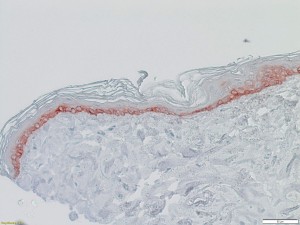Dog Skin in a Petri Dish?
By Caroline Coile
It may sound a bit like Frankenstein, but for the first time full-thickness dog skin has been grown in a laboratory setting. This is important because it means medications and skin care products can be tested without a living animal playing guinea pig, eliminating the need for animal testing, and enabling veterinary therapies to be tried in a controlled environment.
Dogs have a propensity for skin problems. In fact. about 10-15% suffer from allergic dermatitis. Many treatments exist but as anyone knows, dogs lick topicals off, go swimming, and owners forget to apply them. In addition, some topicals can make the dog worse. Now they can be tested without these problems. Nothing like it has existed before.
The skin is grown in a lab from skin samples taken from dogs undergoing surgeries in which skin was removed as a medical necessity, such as in an amputation. It is then subjected to a barrage of enzymes and culture media to create a multi-layer, full-thickness, immortal skin sample. The final product is virtually indistinguishable from real dog skin viewed under a microscope. The skin sample can then be contaminated with bacteria or fungus, for example, and then treated with various drugs to see whether the treatment is effective and safe—all without subjecting an actual dog to the process. The same is true for testing shampoos and grooming products.
The next step is to develop different skin lines from various dog breeds–as well as cats and horses.
For more information check out the WowWowSkin project: https://www.igb.fraunhofer.de/en/reference-projects/wowwowskin.html
Short URL: https://caninechronicle.com/?p=281035
Comments are closed













